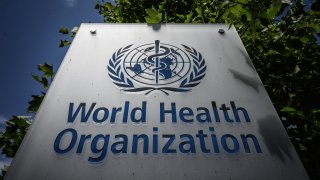
- A coronavirus vaccine this winter won't help countries beat back the current wave of infections, Dr. Mike Ryan, executive director of the WHO's health emergencies program, said.
- The outcomes of severely-ill patients could get worse in some countries with overburdened health systems since health-care workers are forced to ration their time and attention, he said.
- Maria van Kerkhove, head of the WHO's emerging diseases and zoonosis unit, said the vaccine will be an addition to a "toolkit" of public health measures that will be necessary to thwart the virus'
A coronavirus vaccine this winter won't help countries beat back the current wave of Covid-19 infections sweeping across Europe and North America and overwhelming hospitals, the World Health Organization warned on Wednesday.
"We're not there with vaccines yet. We will get there, but we're not there," said Dr. Mike Ryan, executive director of the WHO's health emergencies program, during a live Q&A event. "And many countries are going through this wave, and they're going to go through this wave and continue through this wave without vaccines."
Weeks of growing Covid-19 cases have forced countries in Europe, including the United Kingdom, France and Germany, to adopt strict actions to curb the virus' spread, shuttering nonessential businesses and advising residents to stay home as much as possible.
Those efforts appear to be working so far, with Europe reporting a 10% decline in cases over the past week "for the first time in over three months," according to WHO's latest situation report published on Tuesday.
Coronavirus deaths, which typically lag reported cases by weeks, increased 18% in the region over that same period, however. In the Americas, cases were up 41% for the week and deaths climbed by 11%, according to WHO's report.
Money Report
In the U.S., a record 76,823 Covid-19 patients were in the hospital on Tuesday, according to the Covid Tracking Project, which is run by journalists at The Atlantic. Some states are beginning to impose mask mandates and take more stringent actions against businesses that don't follow social distancing rules, though the measures are inconsistent across the U.S.
"There is now aggressive, unrelenting, expanding broad community spread across the country, reaching most counties, without evidence of improvement but rather, further deterioration," read the White House coronavirus task force's latest weekly report, which was obtained by NBC News.
The outcomes of severely-ill patients could get worse in some countries with overburdened health systems since health-care workers are forced to ration their time and attention, Ryan said.
"Not only do we have full hospitals, but in those hospitals, patients won't do so well," he said. "There's only one way to stop more people from needing to go to the hospital, and that's to stop more people getting exposed and getting infected."
The WHO's warning comes as Pfizer announced on Wednesday that the final data analysis of its vaccine shows it's 95% effective in preventing Covid-19. On Monday, Moderna reported preliminary phase three trial data that similarly showed its vaccine is more than 94% effective in preventing Covid-19.
It will likely take months, maybe even more than a year, to distribute enough doses for the U.S. and the rest of the world to suppress the virus, public health officials and health experts warn.
"Some people think that vaccine will be, in a sense, the solution. The unicorn we've all been chasing. It's not," Ryan said. "How do we get Covid to equal 0? Adding vaccines is going to give us a huge chance, but if we add vaccines and forget the other things, Covid does not go to zero."
Maria van Kerkhove, head of the WHO's emerging diseases and zoonosis unit, said the vaccine will add another piece to a "toolkit" of public health measures that will be necessary to thwart the virus' spread.
Other tools include drugs to treat severely ill patients and adherence to recommended public health measures like social distancing, mask wearing, avoiding crowds and hand hygiene.
"We have in our power right now the tools to change the course of this pandemic, and we're seeing countries do it," she said. "We are also seeing countries that are in scary situations starting to make a little bit of a turn. We're starting to see a decline in incidence with measures that have been put in place."
— CNBC's Berkeley Lovelace Jr. contributed to this report.






